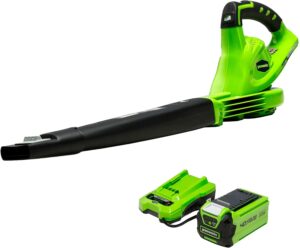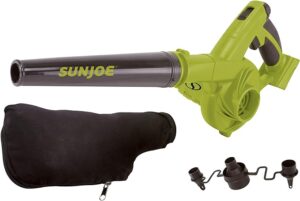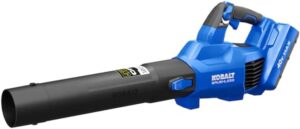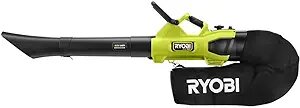Leaf blowers are incredibly efficient tools that transform the laborious task of yard maintenance into a breeze. They offer a quick and effortless way to clear leaves, grass clippings, and other debris from lawns, driveways, and patios, saving homeowners and professionals alike hours of backbreaking work with rakes and brooms. Beyond mere convenience, leaf blowers also provide the versatility to tackle various tasks around the property, from gutter cleaning to mulching, depending on the model. Their ability to concentrate powerful airflow precisely where it’s needed means that users can achieve a meticulously clean outdoor space with minimal effort and time. This efficiency not only enhances the aesthetic appeal of landscapes but also contributes to healthier lawn and garden areas by preventing the accumulation of damp, decaying debris that can harbor pests and diseases.
When purchasing a leaf blower, selecting the right model for your needs involves considering various factors. Based on insights from industry experts and user reviews, here are the five most important criteria to consider:
Power Source and Performance: Leaf blowers are typically powered by gas, electricity (corded), or battery (cordless). Gas-powered blowers offer the highest power and mobility for large properties but are heavier, noisier, and require more maintenance. Electric models are quieter and lighter but may be limited by cord length (corded) or battery life (cordless). Performance is measured in terms of airspeed (MPH) and air volume (CFM); higher numbers indicate more power to move debris.
Weight and Ergonomics: The weight of the leaf blower directly affects user comfort, especially during extended use. Lightweight models reduce fatigue and are easier to maneuver, particularly important for users with mobility issues or for prolonged tasks. Ergonomic designs, such as adjustable handles, harnesses, and anti-vibration features, also contribute significantly to comfort and ease of use.
Noise Level: Noise is a critical factor, especially in residential areas with noise ordinances. Electric models are typically quieter than gas-powered ones. It’s important to check the decibel (dB) rating of the leaf blower and consider the impact on your hearing and your relationship with neighbors.
Versatility and Additional Features: Some leaf blowers offer additional features like variable speed settings, vacuum, and mulching capabilities, making them more versatile. Consider whether you need a simple blower for clearing leaves or a multi-functional tool for yard cleanup tasks. Features like adjustable speed controls, interchangeable nozzles for different types of debris, and ease of switching between modes can make a significant difference in user satisfaction.
Price and Warranty: Your budget and the value you get from the leaf blower are important. Compare prices across different models and brands, keeping in mind the total cost of ownership, which includes maintenance and operating costs (like gas or batteries). A robust warranty can provide peace of mind and protection against defects or early wear.
Leaf blowers are indispensable tools that have revolutionized yard maintenance by offering unparalleled efficiency and versatility. From lightweight, eco-friendly models ideal for small yards to powerful, gas-powered options designed for extensive properties, there’s a leaf blower to meet every need. Key considerations when purchasing include power and performance, the type of power source, weight and ergonomics, noise level, and additional features like vacuum and mulching capabilities. Ratings on these criteria suggest a diverse market, where models like the DEWALT DCBL772X1 Flexvolt and the Ryobi RY404150 stand out for their impressive functionality and versatility, while options like the Greenworks 24252 cater to those prioritizing ease of use and environmental concerns. Ultimately, the choice of a leaf blower can significantly impact the efficiency of yard cleanup, making it a crucial decision for homeowners looking to maintain pristine outdoor spaces with minimal effort.
1. Greenworks 24252 Cordless Leaf Blower:
 This unit is celebrated for its portability and user-friendly design, perfect for quick and efficient yard cleanup, especially in smaller spaces. Its lightweight nature, at only 3.3 pounds, allows for easy handling and maneuverability, reducing user fatigue. The inclusion of a lithium-ion battery offers the convenience of cordless operation, although the 14-minute runtime might necessitate breaks for recharging during larger tasks. Its variable speed controls provide versatility, allowing users to adjust the airflow to suit specific tasks.
This unit is celebrated for its portability and user-friendly design, perfect for quick and efficient yard cleanup, especially in smaller spaces. Its lightweight nature, at only 3.3 pounds, allows for easy handling and maneuverability, reducing user fatigue. The inclusion of a lithium-ion battery offers the convenience of cordless operation, although the 14-minute runtime might necessitate breaks for recharging during larger tasks. Its variable speed controls provide versatility, allowing users to adjust the airflow to suit specific tasks.
Ideal for small yards
Pros: Extremely lightweight, battery included, extension tube for difficult areas, six speed controls.
Cons: Short battery life, limited suitability for large yards.
2. DEWALT DCBL772X1 Flexvolt 60V MAX Blower:
 A powerhouse suitable for extensive yard work, the DEWALT model boasts a brushless motor for efficiency and durability. The four-hour runtime is impressive for a battery-operated unit, enabling prolonged tasks without the need for frequent recharging. The speed lock feature ensures consistent performance, reducing the risk of accidental changes in power. Although its high functionality is an advantage, the weight and cost may be considerations for casual users.
A powerhouse suitable for extensive yard work, the DEWALT model boasts a brushless motor for efficiency and durability. The four-hour runtime is impressive for a battery-operated unit, enabling prolonged tasks without the need for frequent recharging. The speed lock feature ensures consistent performance, reducing the risk of accidental changes in power. Although its high functionality is an advantage, the weight and cost may be considerations for casual users.
Known for its high efficiency and longer runtime
Pros: Long runtime, variable speed with lock, high power and airspeed.
Cons: May be heavier and more expensive than some alternatives.
3. Sun Joe Electric Leaf Blower:
 An excellent entry-level model, the Sun Joe blower provides essential functionality without complexity. The corded design ensures a steady power supply, allowing for uninterrupted operation. While its reach is limited by the cord length, it eliminates concerns about battery life or fuel refills. Its compact size and light weight enhance its appeal for users seeking simplicity and convenience.
An excellent entry-level model, the Sun Joe blower provides essential functionality without complexity. The corded design ensures a steady power supply, allowing for uninterrupted operation. While its reach is limited by the cord length, it eliminates concerns about battery life or fuel refills. Its compact size and light weight enhance its appeal for users seeking simplicity and convenience.
A budget-friendly, easy-to-use
Pros: Lightweight, affordable, consistent power supply.
Cons: Limited by cord range, less powerful than some competitors.
4. Kobalt KHB 4224A-03:
 Balancing power and portability, this Kobalt model delivers significant blowing force in a compact, user-friendly package. The brushless motor is a highlight, promoting efficient and quiet operation. It’s an excellent choice for those needing a reliable tool without the bulk and noise of larger units. However, as with many battery-powered devices, operational time may be limited.
Balancing power and portability, this Kobalt model delivers significant blowing force in a compact, user-friendly package. The brushless motor is a highlight, promoting efficient and quiet operation. It’s an excellent choice for those needing a reliable tool without the bulk and noise of larger units. However, as with many battery-powered devices, operational time may be limited.
solid blend of power and portability
Pros: Powerful, lightweight, efficient operation.
Cons: Battery runtime may limit extended use.
5 Ryobi RY404150:
 This versatile tool combines the functionalities of a blower and vacuum, offering comprehensive yard care. The inclusion of two batteries and a rapid charger mitigates downtime, while the adjustable harness ensures comfort during extended use. Despite its versatility, it may not offer the sheer blowing power of more specialized units, making it a jack-of-all-trades, master of none.
This versatile tool combines the functionalities of a blower and vacuum, offering comprehensive yard care. The inclusion of two batteries and a rapid charger mitigates downtime, while the adjustable harness ensures comfort during extended use. Despite its versatility, it may not offer the sheer blowing power of more specialized units, making it a jack-of-all-trades, master of none.
Stands out with its dual functionality
Pros: Versatile as blower and vacuum, includes harness and rapid charger.
Cons: More expensive, slower airspeed.
6 Litheli 40V Cordless Leaf Blower:
Particularly noted for its efficiency with wet leaves, this model stands out for its lightweight design and user-friendly features, such as a turbo button for extra power. However, its airspeed range and the necessity for two-handed operation to adjust speeds may detract from its appeal for some users.
Known for its lightweight design and ability to tackle wet leaves
Pros: Effective on wet leaves, lightweight, fast recharge.
Cons: Slower airspeed, cumbersome control adjustment.
7 Craftsman Leaf Blower:
Offering robust performance with its gas-powered engine, this Craftsman model is suited for tackling substantial yard debris across larger areas. The trade-off for its power is increased weight and operational noise, plus the need for fuel mixing, which may be considered drawbacks by those seeking quieter, simpler solutions.
powerful airspeed and volume
Pros: Powerful, extended runtime, versatile for different debris types.
Cons: Heavy, noisy, requires fuel mixing.
